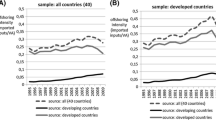Abstract
Most research to date into the causes of the substantial increase in wage inequality in the UK concludes that increased competition from low-wage Newly-Industrialising Countries (NICs) has had very little impact on either the employment or relative wages of unskilled workers.1 But everyday experience suggests the reverse.2
Access this chapter
Tax calculation will be finalised at checkout
Purchases are for personal use only
Preview
Unable to display preview. Download preview PDF.
Similar content being viewed by others
References
Anderton, R. (1996) ‘Trade performance and the role of R&D, patents, investment and hysteresis: an analysis of disaggregated import volumes for the UK, Germany and Italy’, Discussion Paper, 101, National Institute of Economic and Social Research.
Anderton, R. and Brenton, P. (1996) ‘What has been the contribution of trade with the NICs to adverse relative wage movements for the unskilled in Europe?’ paper presented at the conference ‘Europe and Asia: The Impact of Trade with Low-Wage Economies on Employment and Relative Wages in the EU’, Brussels: EIAS (December).
Aw, B.Y. and Roberts, M. (1986) ‘Measuring quality change in quotaconstrained import markets: the case of US footwear’, Journal of International Economics, 21, 45–60.
Brenton, P. and Winters, L.A. (1992) ‘Estimates of bilateral trade elasticities and their implications for the modelling of 1992’, Discussion Paper, 717, Centre for Economic Policy Research.
Chinloy, P. (1980) ‘Sources of quality change in labour input’, American Economic Review, 70, 108–19.
Feenstra, R. and Hanson, G. (1995) ‘Foreign investment, outsourcing and relative wages’, Working Paper, 5121, NBER.
Gregg, P. and Machin, S. (1994) ‘Is the rise in UK inequality different?’, in Barrell, R. (ed.) The UK Labour Market, London: Sage.
Haskel, J. (1996)’ small firms, contracting-out, computers and wage inequality: evidence from UK manufacturing’, Discussion Paper, 1490, Centre for Economic Policy Research.
Helpman, E. and Krugman, P. (1985) Market Structure and Foreign Trade, Cambridge, MA: MIT Press.
Jarvis, V. and Prais, S. (1995), ‘The quality of manufactured products in Britain and Germany’, Discussion Paper. 88, National Institute of Economic and Social Research.
Learner, E. (1994) ‘Trade, wages and revolving door ideas’, Working Paper, 4716, NBER.
Learner, E (1996) ‘In search of Stolper-Samuelson effects on US wages’, Working Paper, 5427, NBER.
Machin, S., Ryan, A. and van Reenen, J. (1996) ‘Technology and changes in skill structure: evidence from an international panel of industries’, Discussion Paper, 1434, Centre for Economic Policy Research.
Nickell, S. and Bell, B. (1996) ‘Changes in the distribution of wages and unemployment in OECD countries’, American Economic Review, Papers and Proceedings, 86, 302–8.
Oliveira-Martins, J. (1994) ‘Market structure, trade and industry wages’, OECD Economic Studies, 22, 1023.
Sachs, J. and Shatz, H. (1996) ‘US trade with developing countries and wage inequality’, American Economic Review, Papers and Proceedings, 86, 234–9.
Smith, A (1997) ‘The labour market effects of international trade: a computable general equilibrium model’, University of Sussex, mimeo.
Wood, A. (1994), North-South Trade, Employment and Inequality Oxford: Clarendon Press.
Editor information
Editors and Affiliations
Copyright information
© 1999 Bob Anderton and Paul Brenton
About this chapter
Cite this chapter
Anderton, B., Brenton, P. (1999). Trade with the NICs and Wage Inequality: Evidence from the UK and Germany. In: Brenton, P., Pelkmans, J. (eds) Global Trade and European Workers. Palgrave Macmillan, London. https://doi.org/10.1007/978-1-349-27035-4_3
Download citation
DOI: https://doi.org/10.1007/978-1-349-27035-4_3
Publisher Name: Palgrave Macmillan, London
Print ISBN: 978-1-349-27037-8
Online ISBN: 978-1-349-27035-4
eBook Packages: Palgrave Economics & Finance CollectionEconomics and Finance (R0)




